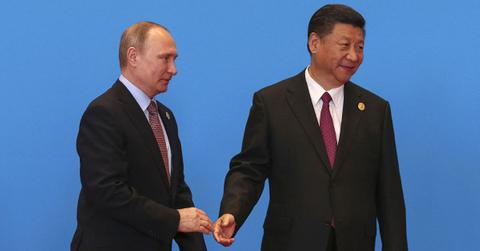Frenemies: Putin in Crisis as Chinese Leader Considers Game-Changing Move Against Russia

Putin has come to count on Xi Jinping as an indispensable ally.
Vladimir Putin's ambitions to dismantle Western dominance on the global stage might face a significant setback from his key ally, China, which could spell trouble for the Kremlin.
During a recent visit to Beijing, the Russian president met with his Chinese counterpart to commemorate 75 years of official relations between their countries.
On the first day of discussions, the leaders announced plans to deepen military cooperation by expanding joint army drills, signaling a potential threat to the West, Express reported.
Additionally, they are expected to discuss further economic collaboration, as trade between Russia and China continues to grow rapidly. Bilateral trade reached $240 billion last year, a 26% increase from the previous year, according to Chinese customs.
Putin has come to rely heavily on Xi Jinping, viewing him as a crucial ally not only in his war in Ukraine but also in his efforts to undermine US geopolitical dominance.
The Kremlin leader has frequently criticized the Washington-led global order, predicting the demise of the current "globalist model."
- Global Threat: Russia Insider Warns West of 'World War Using Nuclear Weapons' Amid Escalating Support for Ukraine
- Stolen Valor: Pair Accused of 'Disgusting, Unacceptable' Theft of Bronze Veteran Grave Markers in Indiana
- Countdown to Disaster? Ex-NATO Official Warns Russia, Iran and China Could Wage WWIII in Just Years
However, Xi might prioritize China's interests over Putin's aspirations of weakening America and the West.
Prominent Russian foreign policy experts and a former commander of the Pacific Fleet have cautioned the Kremlin that Beijing's priorities might not align with Putin's.
Never miss a story — sign up for the Front Page Detectives newsletter. Be on the scene the moment news breaks.
In a report on the "global majority," Sergey Karaganov, Dmitri Trenin and Sergei Avakyants noted that China's integration into the world economy makes it more invested in maintaining the status quo than in disrupting it.
"The reasons are clear: China’s social and domestic stability depend on access to US and EU markets; China isn’t self-sufficient in food," the authors explained.
They also suggested that China might abandon Russia once it achieves "strategic self-sufficiency," potentially forcing Moscow to normalize its relations with the West.
Become a Front Page Detective
Sign up to receive breaking
Front Page Detectives
news and exclusive investigations.
